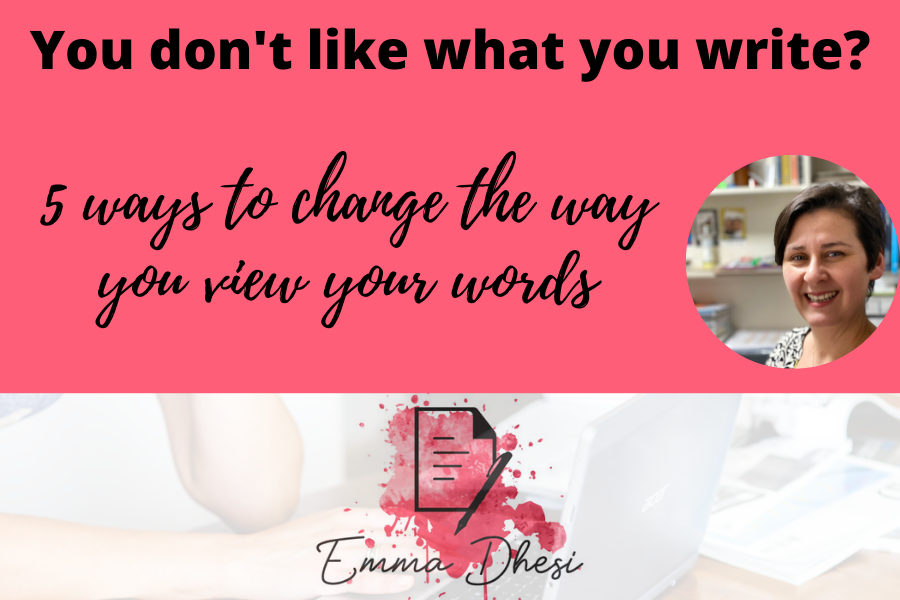From time to time, I link to products or services I love using affiliate links. This means that I may receive a small percentage or fee for referring you to any product you may purchase from one of those sites. It does not cost you anything. These small fees help sustain my small business. I truly appreciate your support.
You don't like what you write?
You don’t like what your write?
Do you feel like everything you write is rubbish? When you read it back do you think to yourself, oh my god that sucks! There are 5 things you can do to move past this.
Being insecure about your work isn’t exclusive to you, believe me! I spent many years doubting every word I wrote.
I wanted to write like my literary heroes but just couldn’t see stories or word choices as being equal to them. And perhaps they weren’t but I didn’t let that stop me.
Does that sound like you? If it does, don’t let your self-doubt stop you from writing because the more you write, the more confident you’ll become.
Everybody has moments of insecurity but the thing is to keep writing, get your words out. You can fix and improve later on. It’s all part of the creative process unfortunately.
There is also a good chance that your first draft, your rough draft, isn’t going to be great and that’s okay.
Remember what Anne Lamott says, all you need is your ‘first shitty draft’. But you keep on writing because only once you have something down on paper can you go back and make better.
As somebody once said, that is why it’s called a rough draft!
So how can you move past being your own worst critic? There are 5 things you can do.
1. Keep writing
I’m sure you’ve heard this before, and you might not find it very helpful, but the truth is the best way to build your confidence is to build a body of work.
This doesn’t need to be a catalogue of novels, it can be just one novel. It can even just be a couple of short stories.
But once you start to see your word count build or the pile of pages on your desk get fatter, you’ll begin to take more pride in the work that you do.
When you create something good for yourself it makes you feel happy and that gives you a confidence boost.
That confidence is what you need to do it again, and more of it.
Again, that makes you feel fabulous about yourself, builds more confidence, and so you go at it again, and again – each time bigger and better.
You produce a circle of positivity for yourself and you’ll find that the circle of positivity replaces the self-limiting belief you carry around with you.
Eventually you’ll figure out that you can finish your novel, you’ll realise that your goal is absolutely doable. It’s just a matter of doing it, lifting your confidence and gaining momentum.
2. Write for yourself
When you write for your own pleasure and your own enjoyment, it takes the pressure away.
If at the back of your mind you’re always worrying about what your family and friends will say, or what a possible agent or publisher will think, you are putting a lot of pressure on yourself to produce work to the standard of your favourite novelist. A novelist who has been writing for a long time and been through the editing process many times.
You will never produce that level of writing on your first attempt and without an editor to help. Fact!
Traditionally published books go through six different editors. Just imagine how much feedback the writer gets then!
What you need to do at this stage is write just for yourself.
What stories do you like to read? What kind of characters do you identify with? Whatever it is, this is what you should be putting into your book.
Don’t worry about grammar, spelling, punctuation, all those things that are secondary to your storytelling. Remember, your superpower is storytelling, not being a linguist!
3. Get feedback
If you are just beginning your writing career, external feedback can be hugely helpful and encouraging.
If you’re not yet part of one, try looking for a local writing group. Not only will you find like-minded people from whom you can get feedback, but the very fact that you are sharing your work will help boost your confidence.
I would add in a caveat: those other readers will give you their opinion, but their opinion is not gospel.
If you don’t agree with something they’ve said, particularly if it’s just one person, you don’t have to follow through on their words. But if there is a general consensus that the story needs a little extra, then that is worth thinking about and perhaps acting on.
If you’re nervous to give your stories to people that you know, you can always employ beta readers. You’ll need to pay them initially but as your confidence strengthens, you’ll rely on them less and less until you get to a point where people are happy to beta read your work because they love it.
In the meantime, having a stranger give an honest opinion on your work might be what you need to boost your confidence and reconnect you with your instincts

4. Overwrite
This is something I find almost impossible but it might be just what you need. When you’re writing your first draft overwrite. Write everything to do with your story.
For example, if you’re writing a 70,000 word novel, write 85,000 to 90,000 words. When you go to edit, you cut out all the extraneous stuff you don’t like and be left with the just the good stuff.
And believe me when I tell you that amongst all the bad there will be a lot of good. You just can’t see it yet.
Self editing can be hugely rewarding because you can take a paragraph that you initially don’t like and craft it into something that you’re proud of, and that feeling is great. It is a part of boosting your confidence and validating your work yourself.
5. Read your work out loud
Often when we read things in our head, it makes perfect sense to us. Only once you start to read your words out loud do the gaps in your writing rise to the top.
You’ll hear for yourself what’s not working and, crucially, what is working.
Give yourself grace
Don’t forget that success comes with time. The writers you so admire have been honing their craft from many years.
They were once where you are now, full of self-doubt and doubting every word they wrote.
If you listen to author interviews you’ll hear even the best seller still struggle with imposter syndrome and are convinced this is the book people will realise they’re not worthy!
Most writers have drawers or files full of work they would never show to the outside world. But they wouldn’t be the writers they are today if they hadn’t written those words.
You are not alone!
Try one of the 5 techniques listed above, one of them might just be what you need to push yourself forward. Intime you’ll start to feel more confident about your work until it gets the point you are happy to share it, and maybe even publish it.
If this article was useful, you’ll love:
If you’ve been working on your novel for years (perhaps even decades) the maybe it's time to consider working with a coach.
If you have multiple versions of your novel and you don’t know which works best, are scared nobody will like your book and don't feel like a 'real' writer, then my guess is coaching is the right next step for you.
Find out more and sign up for your free Clarity Call here: https://emmadhesi.com/personal-coaching/

Emma Dhesi writes women’s fiction. She began writing seriously while a stay at home mum with 3 pre-school children.
By changing her mindset, being consistent and developing confidence, Emma has gone from having a collection of handwritten notes to a fully written, edited and published novel.
Having experienced first-hand how writing changes lives, Emma now helps beginner writers find the time and confidence to write their first novel.




0 Comments